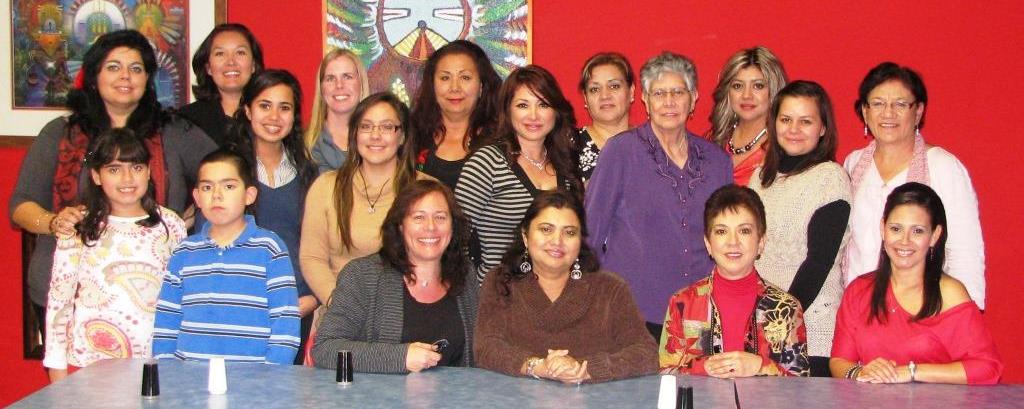New Health Study to Focus on Hispanic Women
The Center of Excellence in Women's Health at the University of Arizona’s Mel and Enid Zuckerman College of Public, has been awarded a $878,000 grant to provide health information to Hispanic women in Pima County.
 |
| Members of the "Reach out for Healthier Communities" research program from the Center of Excellence in Women’s Health and the Pima County Cervical Cancer Prevention Partnership. |
Data shows that Hispanic women historically have limited access to evidence based health information to use when making health care decisions. To address this issue, the Center of Excellence in Women’s Health at the University of Arizona’s Mel and Enid Zuckerman College of Public Health received a research grant of $878,000 to provide health information to Hispanic women in Pima County.
The research program will focus on cervical cancer, sexually transmitted infections, and depression—three priority health issues identified by the Pima County Cervical Cancer Prevention Partnership (PCCCPP).
Funded by the Agency for Healthcare Research & Quality, the three-year project will bring together a multi-disciplinary team of researchers from the Department of Mexican American Studies at the UA College of Social & Behavioral Sciences, Community Health Workers from the PCCCPP, and the Center of Excellence in Women’s Health.
Lead researcher Dr. Francisco Garcia, director of the Pima County Health Department and distinguished outreach professor at the College of Public Health, said Hispanics are the largest and fastest growing ethnic group in Pima County comprising 34% of the total population, according to U.S. Census Bureau data, but of that figure, 20% of adults and 12% of children do not have health insurance, Garcia noted.
Reaching out to diverse groups of people to explain complex health information is one of the many important roles of public health professionals.
Using the screening recommendations by the U.S. Prevention Services Task Force that are covered under the Affordable Care Act, the coalition will translate and adapt women’s health information into a culturally and community relevant educational campaign. The information will be delivered by Community Health Workers, also known as "promotores de salud," to Hispanic women in Pima County.
“Evidence-based recommendations are developed by scientists and the federal government, but many times the information is not delivered in a way that consumers can use,” Garcia said.
Community Health Workers are recruiting 3,000 Hispanic women living in Pima County to participate in the study. The promotores are volunteer and paid frontline public health workers who are trusted members of the community they serve. They play a key role in communicating health information and services to community members.
“Information is not useful if it is not packaged in a way that is understandable to people in the community we want to reach," said Allison Hopkins, PhD, program director at the Center of Excellence in Women’s Health. "Our job is to modify the existing evidence-based recommendations by the U.S. Prevention Services Task Force and deliver them in a way that members of this community will understand.”
During the educational campaign, the research team will track the experiences of the women who participate in the program.
“The results will help determine the impact of the educational campaign,” said Martha Monroy, co-investigator and program director at the Center of Excellence in Women’s Health.
“We want to know how many women get screened after receiving information from the promotores. This will also help us determine if a culturally and locally relevant educational intervention is enough to facilitate behavior change in people who are not getting screened for certain diseases," Monroy said. "We can use this information to improve our next intervention.”
Hopkins said the research has the potential to help Hispanic women in Pima County by providing them with the information and resources necessary to get screened for cervical cancer, sexually transmitted infections, and depression.
“When it comes to public health," she said, "prevention is the key to fighting disease.”
The multidisciplinary research team includes staff from the UA Center of Excellence in Women's Health: Martha Moore-Monroy, Velia Leybas Nuno, Allison Hopkins, Alexandra Armenta, Elvia Lopez Mascorro, Francisco Garcia, Ada Wilkinson-Lee and Pima County Cervical Cancer Prevention Partnership community health workers.
The mission of the Center of Excellence in Women’s Health at the University of Arizona’s Mel and Enid Zuckerman College of Public Health is to improve the health and wellness of women throughout the lifecycle, with an emphasis on underserved girls and women.
For more information about the Reach out for Healthier Communities, research grant, please contact Allison Hopkins at the Center of Excellence in Women’s Health: (520) 626-8528, hopkin28@email.arizona.edu

